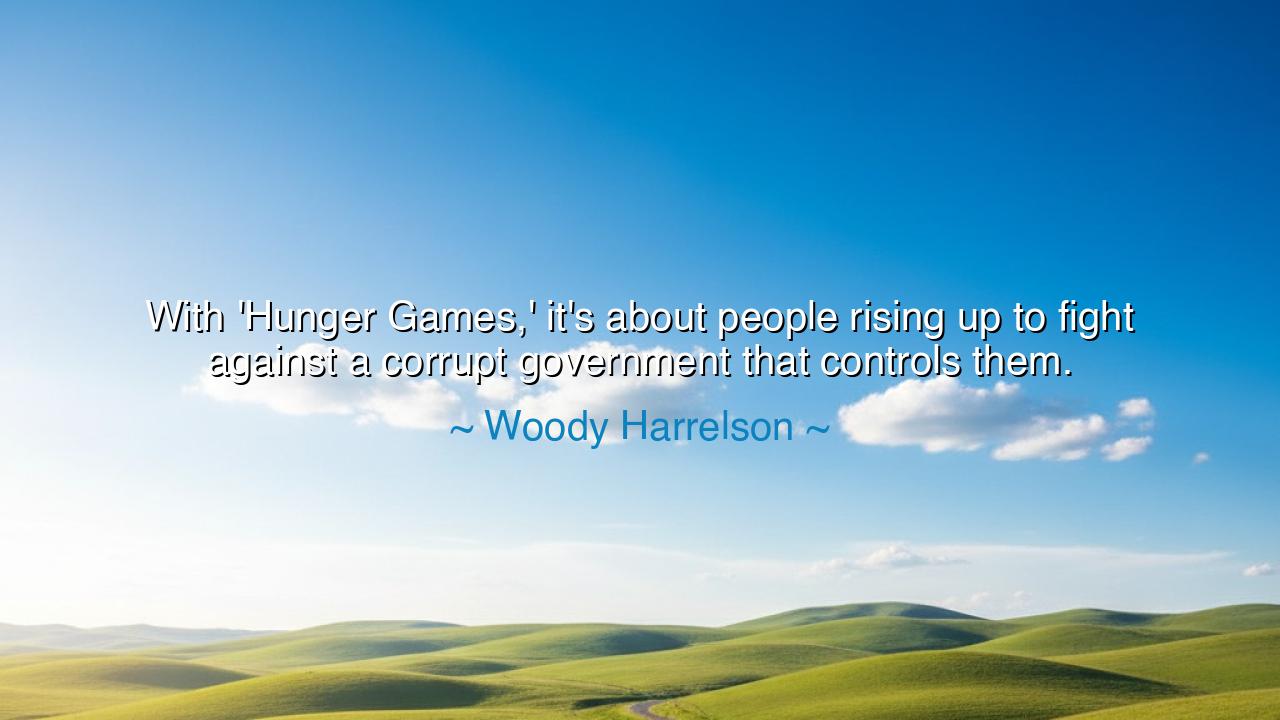
With 'Hunger Games,' it's about people rising up to fight against
With 'Hunger Games,' it's about people rising up to fight against a corrupt government that controls them.






The words of Woody Harrelson, drawn from the fierce allegory of The Hunger Games, are not the musings of an actor alone, but the echo of an ancient truth: “With ‘Hunger Games,’ it’s about people rising up to fight against a corrupt government that controls them.” In this simple statement lies the eternal struggle between freedom and tyranny, between the will of the people and the greed of those who seek to master them. Harrelson, who embodied the weary mentor Haymitch in the film, speaks of more than fiction—he speaks of the spirit that has burned within humanity since its dawn: the refusal to kneel before oppression, the hunger not only for bread, but for dignity.
At its heart, this quote is about resistance and awakening. It tells us that when power becomes detached from compassion—when rulers cease to serve and begin to dominate—then rebellion is not merely a choice; it becomes a moral necessity. The corrupt government Harrelson speaks of is not confined to Panem, the imagined dystopia of the story; it is the reflection of every age in which the powerful have fed upon the powerless. In The Hunger Games, the Capitol rules through fear, spectacle, and manipulation—tools of tyranny as old as empire. The Games themselves are a symbol of control, a performance designed to remind the people of their weakness. But as Harrelson reminds us, no power is eternal when courage awakens in the hearts of the oppressed.
The origin of this insight lies in both art and history. Suzanne Collins, the author of The Hunger Games, drew inspiration from the realities of media manipulation, economic inequality, and the desensitization of society to violence. Her world mirrors our own: where suffering can be televised, where injustice is disguised as order, and where silence is demanded in exchange for comfort. Harrelson, interpreting this through his own conscience, saw the story’s true essence—not as mere entertainment, but as a warning. He recognized in it the pattern that history repeats again and again: when governments forget their people, the people remember their power.
Throughout human history, the flame of rebellion has burned against the darkness of corruption. Consider the story of the French Revolution, when a starving populace rose against a decadent monarchy that bled them dry. The cry of “Liberté, égalité, fraternité” was not born from ideology alone, but from hunger—from the same desperation that drives the districts of Panem to revolt. Or recall the Solidarity movement in Poland, when ordinary workers, armed not with weapons but with courage, defied the machinery of a communist regime and reclaimed their nation’s soul. Each of these moments, like The Hunger Games, tells the same story: that when rulers lose their humanity, the ruled will reclaim it through sacrifice and defiance.
Yet Harrelson’s words also carry a warning. For rebellion, while noble, is not without cost. Those who rise must do so not with hatred, but with purpose. The destruction of a corrupt order means little if what replaces it is no better. History has shown revolutions that devoured their children, uprisings that birthed new tyrannies. Thus, the lesson of The Hunger Games—and of Harrelson’s reflection—is not only to fight corruption, but to heal the world after the fight is done. True victory is not in overthrowing the powerful, but in building a society where power serves the people and justice walks with mercy.
In a deeper sense, Harrelson’s statement calls us to recognize the corruption within ourselves. Governments are built from human hearts, and the same greed that poisons rulers can live quietly in the ruled. Every citizen, every individual, must guard against the comfort of apathy—the subtle form of surrender that allows injustice to thrive. To rise up, as Harrelson speaks of, is not only to march or to fight, but to speak truth, to refuse deceit, to act with conscience in the small corners of life where integrity is tested. Revolution begins not in the streets, but in the soul.
And so, the lesson is eternal: when power corrupts, conscience must rebel. Harrelson’s words remind us that silence in the face of injustice is the first victory of tyranny. Whether in governments, institutions, or our own communities, corruption thrives when the brave grow weary and the wise grow silent. The action we must take is clear—question authority, defend the voiceless, and never confuse order with justice. For the greatest nations, like the strongest souls, are not those that have never fallen to corruption, but those that rise again purified by the fire of truth.
Thus, let this teaching be carried forward, as a sacred inheritance of courage: the fight against corruption is the fight for the human spirit itself. Harrelson’s words, though born from a tale of fiction, speak to the destiny of all ages—that when tyranny builds its towers of gold, the humble and the hungry will one day tear them down. And when they do, it will not be out of vengeance, but out of the eternal yearning that no government, however powerful, can ever extinguish—the yearning to be free.






AAdministratorAdministrator
Welcome, honored guests. Please leave a comment, we will respond soon